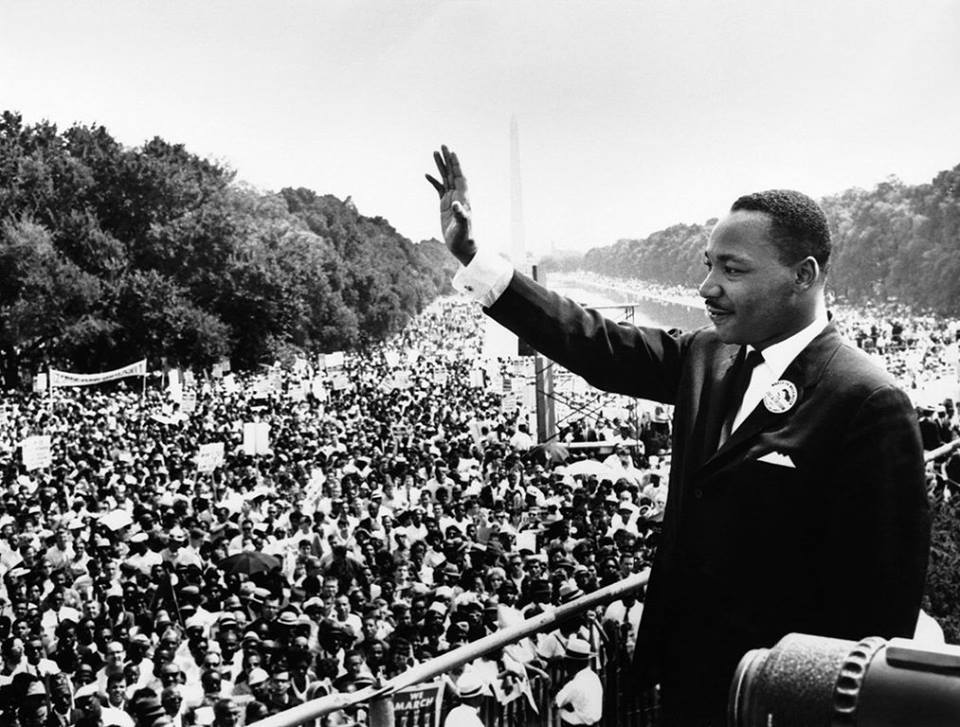Celebrating Dr. King's "Dream," 50 Years Later
 Wednesday, August 28 marked the 50th anniversary of Dr. Martin Luther King Jr.’s famously inspiring “I Have a Dream,” speech bellowed from the steps of the Lincoln Memorial to a crowd of 200,000-plus who had gathered for 1963’s March on Washington for Jobs and Freedom. In those early days, the struggle for racial justice supported by many communities, but focused on the African American struggle that trail blazed the way for the changes that were about to shock the nation.
Wednesday, August 28 marked the 50th anniversary of Dr. Martin Luther King Jr.’s famously inspiring “I Have a Dream,” speech bellowed from the steps of the Lincoln Memorial to a crowd of 200,000-plus who had gathered for 1963’s March on Washington for Jobs and Freedom. In those early days, the struggle for racial justice supported by many communities, but focused on the African American struggle that trail blazed the way for the changes that were about to shock the nation.
The civil rights campaigns evolved into a global movement, creating opportunities for marginalized and oppressed people from all sectors of society—American Indians, Asian Americans, African Americans, Latinos, LGBT people, women, etc.—to unite under a single banner, a single rallying cry for equity.
Dr. King’s life was cut short one April day in Memphis, 1968, when that cry was just beginning to reach around the globe. And since his death, Dr. King’s memory has been bent to fit every political ideology: progressive, conservative and otherwise. But he was more than his “I Have a Dream” speech, more than a symbolic figurehead. And regardless of how we remember his legacy, the bottom line is that Dr. King was committed to justice and equity for all sectors. .
“We must live together as brothers or perish together as fools,” Dr. King once said.
According to a recent AP report, Dr. King openly embraced the civil rights movement’s shift to a broader vision of change, toward “living together as brothers,” and his embrace of Latino struggles underscored the need for “Black/Brown” unity in the civil rights era and beyond. At the risk of oversimplifying, Dr. King understood that a fragmented movement was a weak movement. And that weakness, that division worked (and continues to work) in favor of those who benefit from keeping people of color and low-income communities on the margins. As cited in AP:
King sent [United Farm Workers of American co-founder César] Chávez a telegram in 1966, while Chávez was fasting for collective bargaining rights for farmworkers. In the telegram King told Chávez he was moved.
"The plight of your people and ours is so grave," King said, "that we all desperately need the inspiring example and effective leadership you have given."
Fifty years on, both King and Chávez have achieved immortality in the hearts of advocates and the pages of history books. But their message of solidarity is as relevant as ever—and the need for unity is as urgent as ever. From police violence to anti-immigrant attacks, young lives that ended too soon, like those of Trayvon Martin and Brisenia Flores, discrimination, poverty, lack of access to basic resources and assistance—the struggles and fates of African Americans and Latinos are intrinsically linked. Roughly 20 percent of all African American and Latino workers are underemployed. In Illinois, people of color endure rates of poverty that are much higher than those found in white communities—and in the case of Latinos and African Americans, nearly three times as high. And while race is still sometimes an unfortunate indicator a young child’s future levels of achievement, poverty has become an even more accurate gauge, a truth that compounds the educational hurdles faced by low-income children of color.
Mario Salas, a mixed-race African American and Latino veteran of the civil rights struggles and a professor at San Antonio NW Vista College, said in a 2009 interview with Southern Shift TV:
When you look at communities of color, then what you inevitably discover is that there is commonality … Recognizing that there are things in common is crucial toward developing a working coalition and to break down the barriers that people may have had—or have—toward one another.
In working toward the “dream” of equity Dr. King described 50 short years ago, as both he and Chávez did, we leave behind futile arguments that demean one another’s experiences. And on this anniversary of Dr. King’s most well-remembered speech, we honor his legacy—and the legacies of the thousands of other civil rights activists—by embracing our similarities, attempting to come together at the very least by honoring and supporting one another’s work. There are many obstacles to overcome in fostering that unity as each community deals with its own unique struggles, but as Dr. King reminds us, coming together is the only alternative to “perishing together as fools.”
